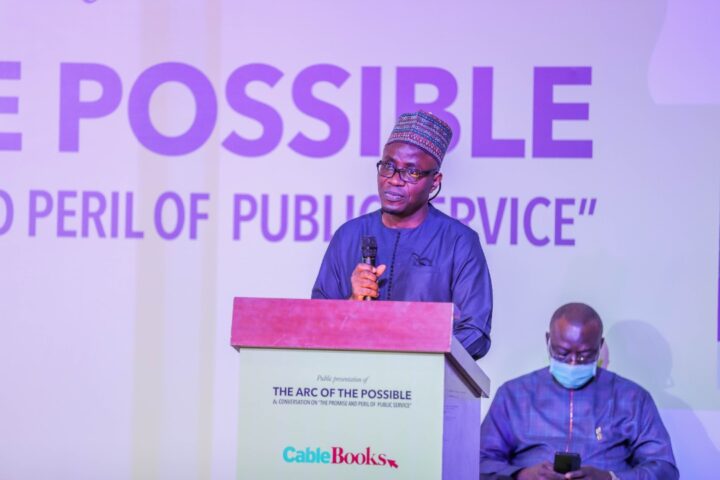In December last year, one of my most rewarding experiences was my decision to travel to Abuja, specifically to attend the public presentation of Waziri Adio’s memoir, this was despite my earlier commitment to speak at two separate events, outside Abuja, two days after. For a man of Adio’s stature, the first thing I observed at the Shehu Musa Yar’Adua Centre, venue of the book presentation, was the moderate yet elegant nature of the event, a curious observation, which I pondered while seated, until Kashim Ibrahim-Imam, the chairman of TEFFUND and the Mutwali Borno, during his extempore, described the event as “Vintage Waziri”.
If you are wondering, just as I did during the entire moment, until I reunited with the former minister for youth and sports development Bolaji Abdullahi, later that day, Imam’s “Vintage Waziri” description, was to convey, that, the moderate nature of the presentation reflects Adio’s modesty, simple nature, and unassuming persona, who is hardly disposed to pomp or pageantry. I wanted to satisfy my curiosity, so I asked Abdullahi, one of those Adio described, as the three-conspirators on the account of their friendship and brotherhood (founder/CEO Cable Newspapers Simon Kolawole and former presidential spokesperson Olusegun Adeniyi), if the incredulous testimonials that were reeled about Adio earlier, were just what they were, or that perhaps people minced their words. Abdullahi immediately raised his gaze and replied in a clear and unambiguous manner, when he said, “no show, that is who he is”. Let me quickly add, that although myself and Adio share a very solid relationship, and despite my knowledge of him, most of the testimonials I heard that day were quite novel and I wanted to be assured, it was not just a thriller.
I will share at least two of the testimonials, both were from Imam, who had known Adio since the late 90s, and has consistently played the role of a guardian including serving as the chief-host at the presentation. Imam, recalled how Adio during his early days in journalism in the early 2000s, rejected the offer of a house, from a prominent politician in Lagos, because according to Adio, if people asked him, how he came about the house of his own, he was not sure he could explain the source, as it was not consistent with his income at the time. Heavens! I can wager that perhaps, during this time, Adio probably never had a house of his own, but he was firm to reject one, because it was unconscionable and inexplicable. Deep.
Another instructive testimonial, also narrated by Imam, was when Adio first made his foray into public service. Imam had recommended Adio to former senate president, Adolphus Wabara, as a special adviser on media. On the day, Adio met Wabara, his potential employer and Nigeria’s number three citizen at the time, an engagement which should originally be an interview for Adio, ironically became an interrogation of sorts, for Wabara. It is on record that Adio, during their interaction, asked rather pointedly, if Wabara, had any skeleton in his cupboard? To be honest, I have never heard such a thing before, I used to think, such stories only existed in the realm of fiction and imagination where only wingless angels existed.
Advertisement
Both testimonials represent the highest level of character strength that can be demonstrated by anyone – therein lies personal examples of courage, integrity, probity, and nobility. They are in fact better summarized, by the timeless Yoruba saying, “iwa rere ni eso eniyan” which is loosely translated that only good character adorns one.
Adio’s book – ‘The Arc of the Possible’, which I read very keenly, was more than just a memoir of Adio’s time as the executive secretary of the Nigerian Extractive Industries Transparency Initiative. The book particularly detailed the uncommon values, Adio espoused and exemplified, as the head of NEITI. Throughout his five-year, non-renewable tenure, Adio, showed that the end was not just the means, for him, the means to the end must be justifiably and creditably discharged, and this was why, he choose the road, less traveled, to typify his mantra, that it is possible!
Adio arrived in public service, as a public critic, who wanted to practice what he had preached in his previous life and jettison what is often described as “that is how it is done”, he therefore committed to lead, by setting personal examples, even if the laws were either silent or ambiguous about such action, an example was the public declaration of his asset on April 13, 2016, only a few weeks after his appointment. While the law does not mandate public officials to make their assets public once it has been submitted to the code of conduct bureau, Adio was convinced that the essence of asset declaration will be lost as a transparency mechanism when it is done quietly. Therefore, by providing the highlights and breakdown of his assets even at great risk, he showed using personal examples that we can address the lacuna in our laws.
Advertisement
In a clear departure from the pervasive norm in public service, where office holders are neither prudent in the application of scarce public resources or use the office to generate material benefits for themselves, reference or support group, a term which Richard Joseph describes as prebendal politics, Adio dared to be different, like the biblical Daniel. As the executive secretary of a senior government agency, he neither moved in convoys or with a retinue of security aides. He also created a clear line between private and official matters, and where there is a conflict of personal interest, he mostly recused himself.
From rejecting a memo that sought to provide him with a laptop, iPad and iPhone at the same time because according to them, it was standard and part of the perks of office, a “standard” which Adio, turned down, while maintaining that he only required a laptop and that it was not a prudent use of government resources, to expend limited government funds on devices that performed almost similar functions, to rejecting hefty hampers from some of the oil companies under its watch, because he believed that such might “hamper” the agency’s oversight and creditable discharge of its function. Again, Adio showed real leadership.
Unlike most people, who consider working in public service as easy work, Adio devoted each passing day to create, expand, and sustain public value. An example was how, in the middle of dwindling government revenue, he ingeniously raised over $1.5 million from donor agencies, to keep the agency on top of its game, support its policy and strategy stream, and even offset some of the financial obligation the agency had to some of its consultants, before his assumption of office.
Although, one may easily argue that these things do not have to be touted, and that expectedly they should be the norm, but we do not have many of Adio’s examples in our public service, who are willing to take the narrow path. If we must therefore push the needle in our governance, then we must encourage current and future public servants to draw from Adio’s experience.
Advertisement
I strongly recommend Adio’s book, ‘The Arc of the Possible’ to everyone who intends to join public service in different capacities. I have made a personal creed, that it is a book, I will read from time to time, to serve as a moral compass and preparatory guide, for an eventual future in public service.
There is therefore, no doubt, that Waziri Adio represents a mirror for all those, including myself, who intend to go into public service. While he does not posit himself as the standard or benchmark, I believe his experience can surely be our tuition.
Views expressed by contributors are strictly personal and not of TheCable.
Add a comment






